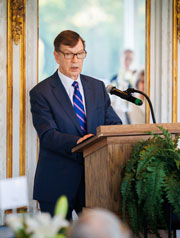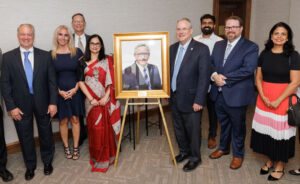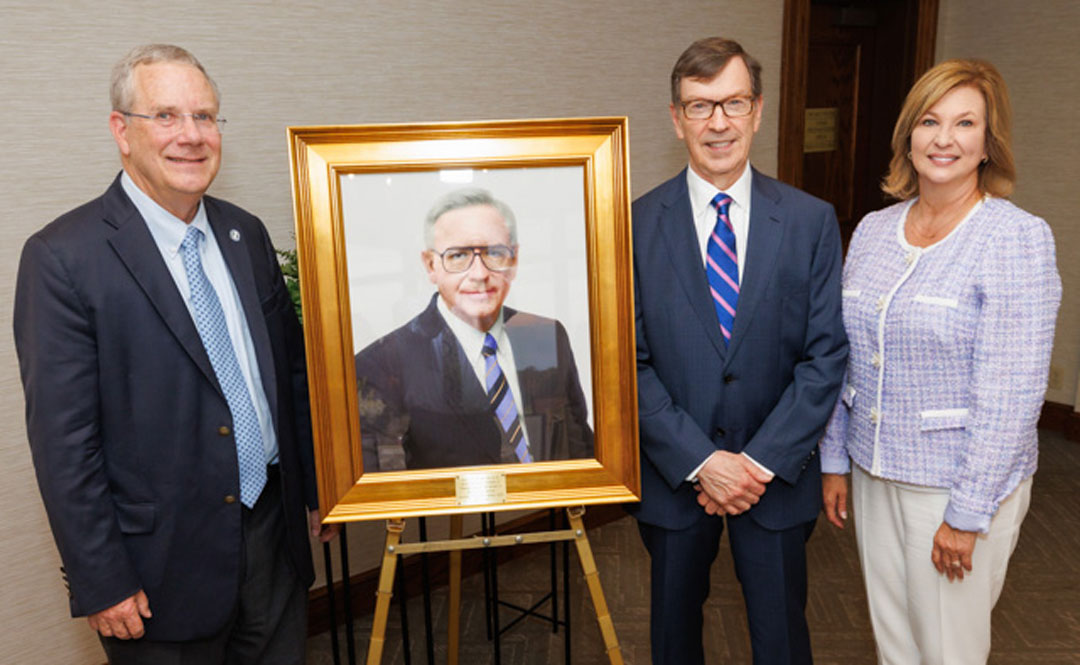The University of Mississippi Medical Center recently celebrated the establishment of the Julius M. Cruse MD, PhD Pathology Endowment, honoring a career in education and science that spanned more than half a century.
Made possible by a generous donation from professor emeritus Dr. Robert Lewis, this endowment honors Cruse’s contributions and commitment to the UMMC Department of Pathology and will support the recruitment and retention of a department chair. In addition to his initial contributions, Dr. Lewis has made a pledge to support an eventual endowed chair at the $1 million level.

“I was most fortunate,” said Lewis at a ceremony on June 27. “I had 42 wonderful years at UMMC. It was my privilege to work with Dr. Cruse for 40 of those years. He was my teacher, my mentor, and my friend. Throughout that time, I learned from this man everything I know today.
“All that I was able to accomplish throughout my career, I owe to his teachings and influence—and for that, I shall be forever grateful. During my time working with Dr. Cruse, I came to know an incredibly brilliant, selfless, kind and compassionate person. His overall demeanor reminds me of Abraham Lincoln’s immortal phrase: ‘With malice toward none and charity for all.’”
A powerhouse of scientific prowess for nearly 60 years, Cruse produced many invaluable contributions to pathology and microbiology. In his illustrious career in pathology, Cruse co-authored 40 textbooks, wrote over 300 scholarly articles, and served as the editor-in-chief of three immunology journals.
Cruse passed away in 2018 at age 81. However, his enduring legacy continues to shape the future of the Department of Pathology at UMMC.
Fascinated by the microscopic world from an early age, Cruse’s connection to the field began long before he was old enough to attend college. As a 13-year-old living in Oxford, he sought permission from a bacteriology professor at the then-two-year medical school at the University of Mississippi to audit lectures and observe the laboratories where the second-year medical students were being taught. Less than a decade later, he would graduate from the University with degrees in chemistry and German.
As a Fulbright Scholar, he would earn a fellowship with the University of Graz in Austria, where he received a post-graduate research degree in medical science summa cum laude in 1960. Continuing his education, Cruse earned his MD/PhD in pathology/immunopathology from what is now the University of Tennessee Health Science Center in Memphis as a pre-doctoral and post-doctoral U.S. Public Health Service fellow before serving an appointment as lecturer of pathology.

At 29 years old, Cruse joined the UMMC faculty in 1967 where he was named the first professor of immunology and director of immunological research. During his 48-year career at the Medical Center, Cruse received many honors. In 1969, he was named the first director of the tissue typing laboratory as part of Professor James D. Hardy’s pioneering transplant program. He later became co-director, along with Lewis, of the transplant immunology laboratories in the Division of Immunopathology.
In 2003, he was appointed the university’s first Distinguished Professor of the History of Medicine. He also served as the Guyton Distinguished Professor of Pathology, Medicine, and Microbiology.
Upon his retirement in 2015, Cruse had established himself as one of the most renowned immunologists of his time.
“[Cruse] will never be forgotten at the University of Mississippi Medical Center,” said Dr. Robert Brodell, professor and chair of the Department of Pathology. “Thanks to a wonderful gift by Dr. Robert Lewis, his memory will be forever enshrined in our university.”
Lewis said, “With the establishment of this endowment for the Department of Pathology’s first academic chair, Dr. Cruse, it is my sincere hope that each of you—whether resident, fellow, faculty or friend—have the opportunity at some point in your life to pay tribute to a loved one who made a truly meaningful contribution to your life, to your success and to your happiness.
By Rachel Vanderford, UMMC Public Affairs


